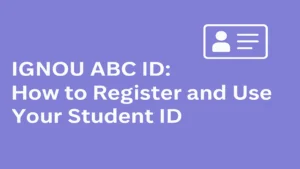The journey of obtaining a degree from the Indira Gandhi National Open University (IGNOU) can be rewarding and transformative. However, beyond the knowledge gained, one of the most critical aspects of your education that employers often look at is your IGNOU Grade Card. But, how much weight does this grade card actually carry when it comes to securing a job? Can a good grade card really open doors, or is experience and skill the ultimate deciding factor?
In this comprehensive guide, we’ll explore how the IGNOU Grade Card can impact your job opportunities, why employers care about your academic performance, and how you can leverage your grade card to advance in your career. 🚀
Introduction: Why Your IGNOU Grade Card Matters in the Job Market
Why Employers Consider Academic Qualifications and Grades
The job market is incredibly competitive. While skills and experience often take center stage, many employers still look at academic qualifications to assess your knowledge, commitment, and ability to perform at a high level. A strong grade card can give recruiters a snapshot of your work ethic and dedication throughout your degree program.
The Role of Distance Learning and Perception in Hiring
Distance learning has evolved, and institutions like IGNOU have become well-respected. Employers are increasingly acknowledging the value of degrees earned through non-traditional learning models. However, perceptions still vary. Some hiring managers may assume that distance education lacks the rigor of traditional classroom-based education. That’s why your grade card plays an essential role in showing you’ve kept up the effort and discipline in a flexible learning environment.
What is an IGNOU Grade Card? A Quick Overview
Structure of the Grade Card
An IGNOU grade card reflects your academic journey, showing grades for each of your courses. Typically, the grade card includes:
- Grades: These represent your performance in each subject.
- Credits: Credits indicate the weight or importance of each course.
- Overall Performance: This is a cumulative assessment of your work throughout the program.
Each course is assigned a grade, which in turn is given a specific grade point value. For example, grades like A, B, C, etc., have corresponding grade points (e.g., 10 points for grade A, 8 for grade B).
Why Each Component Matters
Your grade card is a reflection of your understanding of the course material. It indicates to employers how well you grasped the subjects, how dedicated you were, and how well you managed your time and learning. Employers generally look at your overall performance, but they may also zoom in on specific courses relevant to the job role you’re applying for.
The Perception of IGNOU Degrees in the Job Market
Misconceptions About Distance Education
While distance education, especially from IGNOU, has gained recognition, there are still some misconceptions. Some people assume that degrees earned through distance learning may be less prestigious than traditional university degrees. This perception can be a barrier when applying for jobs, especially in more competitive fields.
Increasing Acceptance of Distance Education
Over time, more and more employers are recognizing the value of degrees from institutions like IGNOU. Many industries now respect the discipline, motivation, and time management skills required for distance learning. Furthermore, in today’s world, where remote work and online education are gaining traction, employers are starting to see the relevance of qualifications earned through online learning platforms.
How IGNOU Grades Reflect Your Academic Performance
What Employers Look for in Grades
Employers generally expect to see a balance of good grades across your subjects. Strong academic performance often reflects qualities like:
- Attention to Detail: Consistent high marks suggest that you are detail-oriented and can grasp complex topics.
- Dedication and Hard Work: Higher grades often show that you were committed to your studies despite the flexibility that distance learning provides.
- Subject Knowledge: In specific fields, employers look at your grades in relevant subjects to gauge your expertise.
The Correlation Between High Grades and Employability
It’s no secret that good grades can give you a competitive edge. If you have strong grades, employers may feel more confident in your ability to learn, adapt, and perform well in the job. Particularly in industries like education, research, and government, a strong grade card might be one of the key deciding factors.
Can You Land a Job with Average Grades?
Of course, the job market is not only about academic performance. If your grades are average, you can still land great opportunities, especially if you focus on building your skills, gaining practical experience, and networking effectively. Many employers prioritize hands-on experience over grades. But a good grade card does still help get your foot in the door.
Employer Preferences: Does a Good Grade Card Open More Doors?
Which Industries Care Most About Grades?
Certain industries prioritize academic qualifications and good grades more than others. For instance:
- Government Jobs: Often require specific grade thresholds for eligibility in exams and interviews.
- Finance & IT Sector: Some companies in these fields look for evidence of technical skills and analytical ability, which may be reflected in your grades.
- Education: Schools and universities often require applicants to have good academic qualifications to ensure they meet the standards required for teaching.
How Good Grades Can Improve Your Chances of Getting Hired
Good grades act as a powerful signal to employers that you have the intellectual capability to perform well in the job. They are particularly beneficial when you’re applying for highly competitive entry-level positions where companies may receive hundreds of resumes.
The Impact of IGNOU Grade Cards on Entry-Level Jobs
How a Strong Grade Card Boosts Your Chances for Entry-Level Roles
When applying for entry-level positions, recruiters often sift through a large number of applications, many from candidates with similar qualifications. In such a competitive environment, a strong IGNOU grade card can significantly boost your chances of being shortlisted. A good academic record shows that you are capable of handling the responsibilities of the role, even if you don’t have years of experience.
For example, companies in sectors like finance, marketing, and IT may look at your grades to assess your analytical and problem-solving abilities. A high grade in subjects like mathematics, statistics, or IT-related courses can signal to recruiters that you possess the fundamental skills needed to succeed in these fields.
How Low or Average Grades May Hinder Early-Stage Career Opportunities
On the flip side, low or average grades can potentially limit your opportunities for entry-level positions. Recruiters may perceive average grades as a sign that you lacked focus, commitment, or dedication during your studies. This is especially true in fields where high academic standards are expected, such as research, engineering, and healthcare.
However, it’s essential to note that a low grade card doesn’t spell the end of your career aspirations. It’s crucial to compensate for weaker academic performance by gaining practical skills through internships, freelance projects, or even relevant certifications. If you are proactive in demonstrating your skills and passion for the field, you can still land an entry-level job.
Key Industries Where Grades Matter Most in Hiring Decisions
Some industries place a higher emphasis on academic performance, especially for entry-level jobs. These include:
- IT and Software Development: Many tech companies prioritize candidates who can demonstrate technical knowledge through strong grades in subjects like programming, database management, and software engineering.
- Government Jobs: Public sector organizations often have strict requirements for academic qualifications and grades. Your IGNOU grade card may play a significant role in your eligibility for exams or interviews.
- Finance and Banking: Employers in the finance sector value strong academic records, particularly in mathematics, economics, and business management, to ensure that candidates possess the analytical abilities required for the job.
Grade Cards and Higher Education: A Stepping Stone to Better Opportunities
The Role of a Good Grade Card in Securing Further Education
A solid grade card doesn’t just open doors to jobs—it can also be a key that unlocks opportunities for further education. Many graduates from IGNOU aspire to continue their education and pursue master’s programs, diplomas, or specialized certifications. In such cases, your grade card is often used to assess whether you have the academic foundation necessary for advanced studies.
For example, a high score in your undergraduate degree from IGNOU could make you a competitive candidate for top master’s programs at renowned institutions, both in India and abroad. Many universities and colleges look at your academic performance, including your grade card, to evaluate your suitability for advanced studies.
IGNOU as a Foundation for Further Specialization and Advanced Degrees
Besides helping you gain entry into postgraduate programs, a good grade card can also give you the credibility needed to specialize in specific fields. Whether you want to pursue an MBA, a Master’s in Computer Science, or a postgraduate diploma in education, a solid academic foundation from your IGNOU degree will make you a more attractive candidate.
For example, if you have good grades in courses like economics, finance, or accounting, you may be able to gain admission to an MBA program or a specialized degree in finance. On the other hand, a high-grade card in technology courses can help you qualify for an MSc in Computer Science or similar programs.
Soft Skills vs. Academic Scores: What Employers Value More?
Balancing Academic Performance with Practical Experience
While academic performance is essential, many employers value practical experience and soft skills just as much, if not more. Soft skills like teamwork, communication, problem-solving, and leadership can sometimes outweigh a lack of perfect grades. Employers often understand that real-world job performance depends not only on academic knowledge but also on how effectively you can communicate, collaborate, and adapt in a work environment.
For instance, a candidate with excellent grades but poor interpersonal skills may struggle in a client-facing or collaborative role. Conversely, a candidate with strong soft skills but lower academic performance may excel in jobs that require interpersonal interaction, creativity, and problem-solving.
How Soft Skills Can Compensate for Average Grades
If you have average grades, you can still stand out by showcasing your soft skills. Here’s how:
- Leadership: If you held leadership roles in student clubs, internships, or volunteer work, make sure to highlight these experiences.
- Communication: Strong communication skills, both verbal and written, are highly valued by employers. If you’ve done presentations, written reports, or communicated with clients, demonstrate this on your resume.
- Problem-Solving and Adaptability: These qualities are key to thriving in fast-paced environments. Showcase projects where you faced challenges and came up with creative solutions, even if they were outside of your academic studies.
By emphasizing your soft skills, you can turn your average grades into an asset, demonstrating that you have more to offer than just academic knowledge.
Does IGNOU Grade Card Play a Role in Job Promotions?
How Your Grade Card Influences Career Progression
In many organizations, a strong academic record can play a role in job promotions. For instance, some companies offer internal job advancement opportunities based on employees’ academic achievements, particularly if they’ve pursued further education or professional development courses while working. A solid IGNOU grade card can signal that you have the drive to succeed and are capable of learning and growing within the company.
Moreover, in industries like IT or finance, employers often place importance on your educational background when evaluating potential candidates for senior roles or team leadership positions. A good grade card, combined with proven performance in the workplace, may make you a stronger contender for promotions.
The Role of Continuous Learning and Certifications
While your grade card may initially help you get promoted, continued learning through certifications, workshops, and additional qualifications is key to moving forward in your career. For example, if you are working in digital marketing, certifications like Google Analytics, HubSpot, or Facebook Blueprint can complement your IGNOU degree and help you move up the career ladder faster.
Furthermore, many employers appreciate employees who take the initiative to further their knowledge, as this demonstrates self-motivation and a commitment to staying relevant in the industry.
The Role of IGNOU Grade Cards in Government and Public Sector Jobs
Specific Government Recruitment Processes Where Grades Matter
Government job opportunities often have specific academic criteria, and your IGNOU grade card can play a crucial role in your eligibility for certain positions. Many government agencies require a minimum grade point to qualify for various exams, interviews, or recruitment processes.
For example, when applying for civil services, banking exams, or state administrative services, your academic qualifications, including your IGNOU grade card, may be reviewed as part of the eligibility criteria. In addition to meeting the minimum educational requirements, candidates are sometimes asked to provide detailed grade information as part of the application process.
How IGNOU Grades Are Evaluated in Public Sector Job Applications
Government bodies may place a significant emphasis on your grade card when considering you for roles, especially if the job involves technical knowledge or analytical skills. Your grade in relevant courses can help recruiters gauge your proficiency in specific areas such as mathematics, economics, or administrative law.
For instance, in exams for positions like bank clerks or probationary officers (POs), candidates are often required to submit their academic credentials, including their grade cards, as part of the application. While the interview and exam performance are also considered, your grades could help you qualify for the next stage.
How to Leverage Your IGNOU Grade Card in Job Applications
Strategies for Presenting Your Grade Card Effectively in a Resume
Your grade card doesn’t just sit on your university portal; it can be an essential part of your job application. When crafting your resume, you don’t need to list every course, but focus on the courses relevant to the job you’re applying for. Highlight strong grades in key areas, particularly those that align with the job role.
- For example, if you’re applying for a marketing role, focus on the courses where you excelled in consumer behavior, business management, or communications.
- If you’re applying for an IT position, showcase courses in programming, database management, or networking where you performed well.
How to Highlight Strengths and Compensate for Weak Areas
If you didn’t score exceptionally well in certain subjects, don’t shy away from mentioning them. Instead, focus on what you’ve learned from those experiences and how you’ve worked to improve. If you’ve taken additional courses or certifications to enhance your knowledge in weak areas, be sure to mention them.
Additionally, use your cover letter to emphasize your strengths, skills, and the real-world experience you’ve gained, particularly if you’ve worked on relevant projects or internships.
Beyond the Grade Card: Building a Strong Career Profile
How to Supplement Your Grade Card with Other Qualifications
Your IGNOU grade card is just one aspect of your career profile. To truly stand out in the job market, supplement your grade card with additional qualifications, such as professional certifications, online courses, and internships. These not only enhance your resume but also demonstrate your commitment to continuous learning.
- For instance, completing certifications from platforms like Coursera, LinkedIn Learning, or Google can show that you are proactive and motivated to stay ahead in your field.
The Importance of Networking and Professional Connections
Networking is one of the most powerful tools in advancing your career, and it can significantly enhance the value of your IGNOU grade card. While academic performance may get your foot in the door, it’s your network and professional connections that often lead to job opportunities.
- Building Relationships: Join professional groups, attend industry events, and engage in forums related to your field. For example, if you are in the IT or business sector, attend meetups, webinars, and conferences to connect with potential employers or mentors.
- Leveraging Social Media: Platforms like LinkedIn provide opportunities to connect with industry professionals, share your achievements, and get involved in relevant discussions. A well-curated LinkedIn profile can highlight your skills and qualifications beyond just your grade card.
Having strong professional relationships and being part of relevant communities can not only open doors to job opportunities but also provide mentorship and career advice that can help you progress faster.
Real-Life Case Studies: IGNOU Graduates Who Overcame Average Grades
Success Stories of IGNOU Graduates with Average Grades
It’s important to remember that your grade card doesn’t define your career. Many successful professionals have overcome average grades by leveraging other aspects of their profiles—like practical experience, certifications, and networking.
Case Study 1: Ramesh Kumar – A Software Engineer
Ramesh graduated with an average grade card in computer science from IGNOU. Initially, he struggled to land his first job due to his grades, but he didn’t give up. He took up online courses in advanced programming, participated in coding challenges, and built a portfolio of personal projects. His persistence paid off when he landed a software engineer role at a leading tech company. Ramesh’s story demonstrates how skills and determination can overcome academic challenges.
Case Study 2: Ayesha Sharma – Marketing Manager
Ayesha graduated with a Bachelor’s in Business Administration from IGNOU. Although her grades were average, she actively participated in internships, worked on real-world marketing campaigns, and gained hands-on experience. She also earned certifications in digital marketing and social media strategies. Ayesha eventually secured a role as a marketing manager at a well-known firm, proving that practical experience and continuous learning can outweigh less-than-perfect academic performance.
Key Takeaway: These success stories emphasize the importance of persistence, self-improvement, and continuous learning. You can overcome an average grade card if you supplement it with skills, certifications, and networking. While your grades matter, they’re just one piece of the puzzle in building a successful career.
Conclusion: Navigating Job Opportunities with an IGNOU Grade Card
Recap of the Role of IGNOU Grades in Job Opportunities
Your IGNOU grade card is a critical component of your job search strategy, especially early in your career. While it provides potential employers with insights into your academic performance and knowledge base, it is not the sole determinant of your career trajectory. A good grade card can undoubtedly enhance your chances of landing a job, but your skills, experience, and soft skills are what ultimately set you apart.
Employers appreciate a well-rounded candidate who can demonstrate not only academic excellence but also the ability to apply knowledge in real-world situations. Whether you’re aiming for an entry-level role, seeking career progression, or planning for further education, understanding how to leverage your grade card can make all the difference.
Final Thoughts on Leveraging Your Academic Credentials
Don’t rely solely on your grades to define your career prospects. Instead, focus on building a well-rounded profile that includes a combination of:
- Practical experience: Internships, freelance work, and real-world projects.
- Certifications: Enhance your expertise through relevant courses and qualifications.
- Networking: Build relationships with industry professionals to increase your job opportunities.
At the same time, continue improving your soft skills and gaining new knowledge. Your academic background from IGNOU gives you a solid foundation, but success in today’s competitive job market requires a diverse skill set, adaptability, and a commitment to lifelong learning.
14. FAQs About IGNOU Grade Card and Job Opportunities
Can IGNOU Grades Help Me Land a High-Paying Job?
Yes, while high-paying jobs typically require relevant skills and experience, a strong grade card can give you a competitive edge in the hiring process. However, employers also look for practical skills, work experience, and cultural fit. Make sure to complement your grade card with hands-on projects, certifications, and networking.
Should I Retake a Course to Improve My Grade Card?
If your grades in certain courses are below your expectations, retaking those courses might be beneficial, particularly if they are crucial to the job you want. But, before retaking a course, evaluate whether gaining real-world experience, adding relevant certifications, or focusing on developing new skills would be a better investment of your time and energy.
How Much Weight Do Employers Give to My Grade Card?
It depends on the industry, the job role, and the specific employer. While some sectors place significant weight on academic qualifications and grades (e.g., government jobs, finance, and education), others may prioritize practical experience and skills. It’s essential to balance your grade card with other qualifications, such as work experience and soft skills, to appeal to a broader range of employers.
Related Posts:
- Access IGNOU Assignment Question Papers Online 2025: Comprehensive Guide
- How to Effectively Solve IGNOU Assignment Questions 2025
- Create a Proper IGNOU Assignment Front Page 2025: Step-to-Step Guide
- How to Download IGNOU Results Online 2025: A Comprehensive Process
- Change IGNOU Login Password 2025: A Comprehensive Step-by-Step Guide




